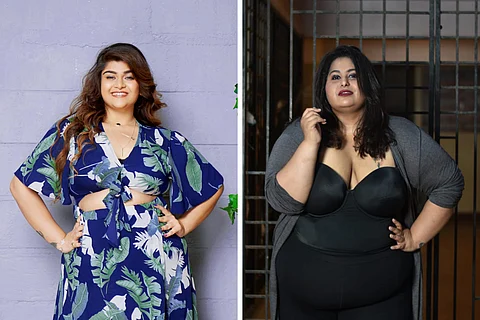

Five years ago, Dipti Bharwani met somebody who changed her world, or the way she viewed it. The Mumbai-based fashion designer says that since childhood, she had struggled with severe body image issues, as she was plus sized. These insecurities, she says, she carried with her into her 20s. And then at 25, she met him.
“He was a gym instructor that my brother introduced me to so that I could lose weight. One look at me and he told me that I was beautiful, and that I didn’t need to lose weight to look good. He said my goals while training should be different,” Dipti recalls. That day, she says she cried.
“As far as I remember, nobody has called me beautiful. So when a person, who is used to seeing fit people, and is trained to make people look ‘conventionally beautiful’ told me this, I couldn’t help but cry” she says.
For Dipti, the five-year-old interaction with her gym trainer marked her journey into ‘body positivity’ and conversations on self love, which she has brought to her social media accounts.
Twenty- six year old Payal Soni, also from Mumbai, says that she struggled in college as she had always wanted to model, but recounts even her close friends discouraging her. “They would say that I didn’t fit the body type and that I shouldn’t walk the ramp. Back then, I was so unaware of self-love and acceptance. I didn’t realise that my friends were fat shaming me, and that there was a global social movement disrupting conventional standards of beauty,” she tells TNM.
Today Payal is a plus sized model, and is among the first plus sized models to walk the Lakme Fashion Week. She is also a social media influencer and has worked with brands including Olay, Enamor, SheIn, Daniel Wellington etc. On Instagram, she says her job is to further conversations which break conventional notions of beauty, and normalising all body types.
“There has been an attitude shift, with several big brands and magazines featuring plus sized models for their collections or on their covers. But it is important to keep the conversation going, to help lots of people unlearn biases.
A simple example, Payal says is her experience shooting with certain brands or modeling agencies. “You just get the vibe that they don’t see you like the other models. I once had an experience where they told me I couldn’t wear the clothes that I picked, and that they had to ‘cover me up’. It didn’t feel good,” she adds.
Among the most frequently asked questions on Payal and Dipti’s Instagram is this — “Are you not promoting obesity by saying you’re happy with the way you are?”
Dipti says that this could not be further from the truth.
“For Instance, the person asking this question has no idea what I have been through. They don’t know why I am the way I am. They don’t know if my being plus sized is a result of hormonal issues or if it is some other medical problem. They assume that I am inactive and that I eat a lot and do not work out and hence I am big - all of this based on my appearance,” she says.
A quick Google search tells readers that Body Positivity is a social movement rooted in an understanding that every individual should have a positive image about their body. In doing so, it challenges the way society presents and views a man’s or a woman’s body, and stepping away from conventional beauty standards.
“I honestly feel people should stop asking others if they have gained weight or if they don’t go to the gym? Even telling people they have lost weight is a type of fat phobia on display,” Dipti adds.
Incidentally, both Payal and Dipti frequently post pictures and videos of themselves working out.
While attitude shifts are important, what plus sized influencers are really asking for is ‘acceptance’ translating to real world changes, especially when it comes to the fashion and lifestyle industry.
“Most brands in India offer XL, XXL and XXXL. Which means that for me, a US size 26 (size 6XL or 8X), there are practically no options in the market. Brands need to learn the plus sized industry — that it is whole spectrum with all kinds of sizes. There are brands catering to skinny women who are well endowed, or offering options for the thinner sizes in the plus sized options. Go to a denim store and you might get jeans for size 42, but not for a size 58. This needs to change with more inclusivity in sizing options being introduced,” Dipti explains.
Most high end designers in India do not offer plus size options. However, Dipti says that for casual wear, Indian wear brands (selling kurtas etc) such as Shop Sneh, Global Desi, Threads, Button etc do have decent sizing options for plus sized women.
Over the past few years, several brands for plus sizes have cropped up, Dipti says.
“For active sports wear there is a Delhi based brand called Animal Spirit which is lovely. They have vibrant colours and vast sizing options. Skyria too is great,” Dipti says. “For western wear, there is Carpe Diem by NeVi, Amydys, Calae, Pluss, H&M, Bewkhoof, Girl Like Me, The Plum Tree, Sztori, Urbanic and others,” Payal adds.